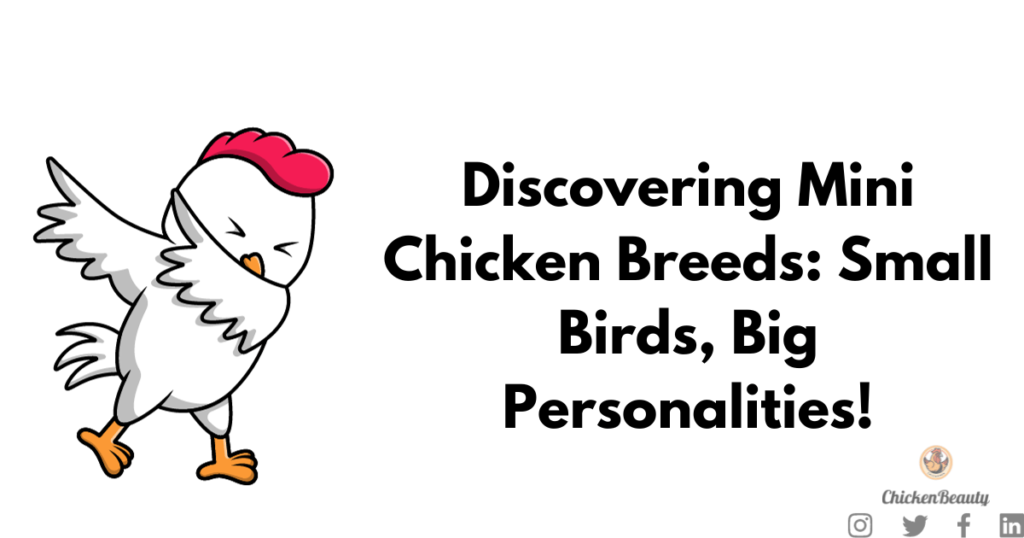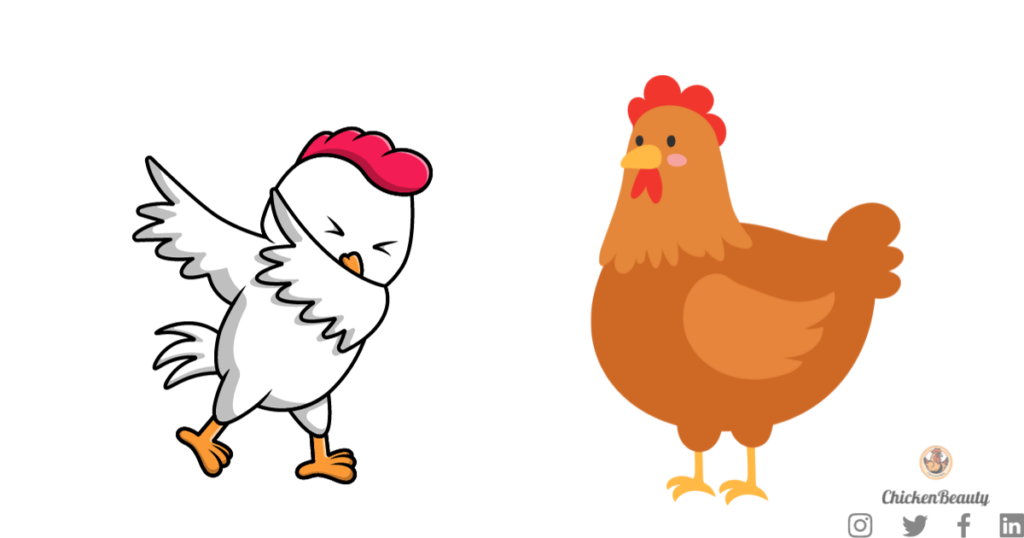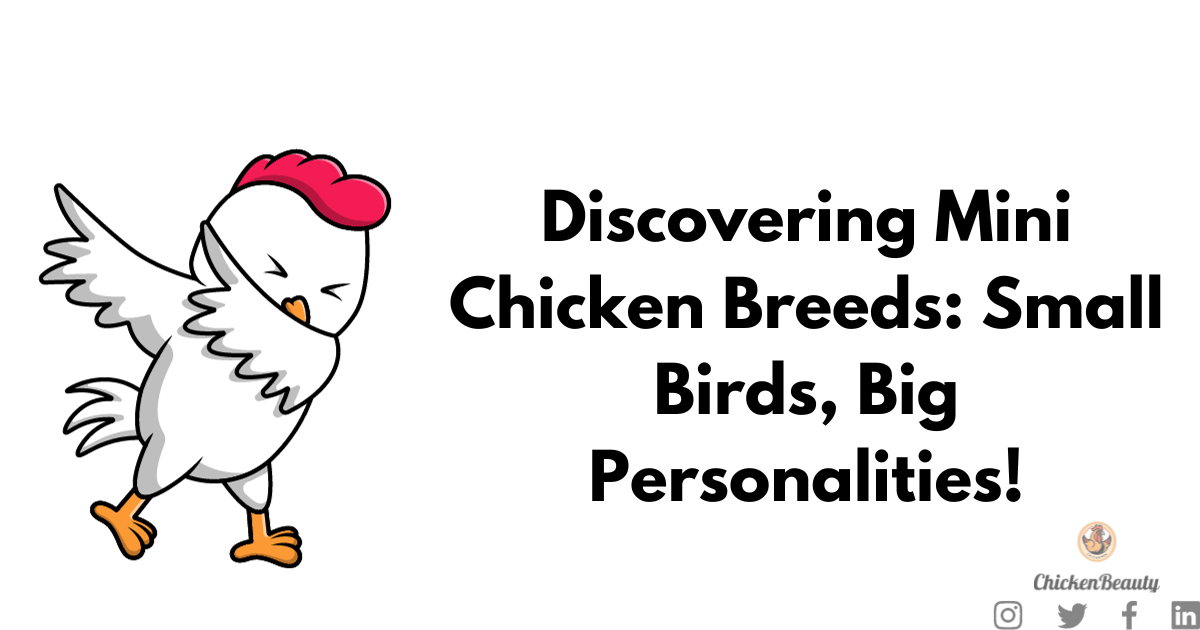Are you ready to dive into the world of mini chicken breeds? These little feathered friends pack a punch of personality in a tiny package. In this article, we’ll explore these adorable pocket-sized poultry pals and find out why they’re all the rage in backyards across the world.

What Are Mini Chicken Breeds?
Mini chicken breeds, as the name suggests, are the “fun-sized” versions of your typical farmyard fowls. They’re like the pocket edition of chickens, only they won’t fit in your actual pocket. These dainty birds are not just cute but practical too.
Advantages of Mini Chicken Breeds
One of the most significant advantages of mini chicken breeds is their size. These petite poultry companions take up less space, making them an excellent choice for those with limited room for traditional chicken coops. Additionally, their smaller size translates to lower food and maintenance costs, making them a cost-effective option for poultry enthusiasts.
Why Mini Chickens Breeds Are Trending
Mini chickens are like the Instagram influencers of the poultry world, but with actual substance. Here’s why they’re all the rage:
1. Space Savers: These little guys are perfect for small backyards. If your garden is feeling a bit cramped, mini chickens might be the answer.
2. Egg-citing Eggs: Despite their size, mini chickens lay eggs that are just as tasty and nutritious as their bigger counterparts. Mini eggs, anyone?
3. Feathered Entertainers: Mini chickens are big on personality. They’re known for their amusing antics and endearing quirks. They’re the stand-up comedians of the coop.
Challenges of Raising Mini Chickens
Raising mini chickens, also known as bantam chickens, can be a rewarding and enjoyable experience, but it comes with its own set of challenges. Here are some of the challenges you might face when raising mini chickens:
- Size: Mini chickens are significantly smaller than standard chicken breeds. This means they may be more vulnerable to predators, including hawks, raccoons, and even larger domestic animals. You’ll need to take extra precautions to protect them.
- Egg Size: Bantam hens lay smaller eggs than standard-sized hens. If you’re raising chickens primarily for egg production, you’ll need to collect and use more bantam eggs to meet your needs.
- Broodiness: Bantam hens are known for being more broody, meaning they have a strong tendency to sit on their eggs and try to hatch them. This can disrupt egg production and require careful management.
- Cold Tolerance: Due to their smaller size, mini chickens may be less cold-tolerant than larger breeds. You might need to provide additional protection and warmth during colder months.
- Feeding: Mini chickens require a specialized diet with smaller feed particles compared to standard-sized chickens. You’ll need to ensure they receive appropriate nutrition.
- Space Requirements: While mini chickens are smaller, they still need space to roam and forage. You may need to adjust your coop and run size to accommodate their needs.
- Social Dynamics: Integrating bantam chickens with standard-sized chickens can be challenging due to differences in size and behavior. You may need to separate them to avoid conflicts.
- Nesting Boxes: Mini chickens may need smaller nesting boxes compared to standard breeds, which can impact your coop design and space management.
- Health Issues: Mini chickens can be more prone to certain health issues, such as Marek’s disease, due to their smaller size and genetics. Regular health checks and vaccinations may be necessary.
- Breeding Challenges: Breeding bantam chickens comes with its own set of complexities, as you need to carefully select compatible pairs and monitor the health of chicks, which can be more fragile.
- Market Value: If you plan to sell bantam chickens or their eggs, they might not be as in demand as standard breeds, which can affect your ability to sell surplus birds or produce.
ALSO READ
Can Chickens Eat Tomato Leaves? A Clucking Good Question!
Chickens and Green Tomatoes: Can Chickens Eat Green Tomatoes?
Can Chickens Eat Cherry Tomatos?
Can Chickens Eat Oranges? The Surprising Truth Revealed!
Unlock the Hidden Power of Chicken Feet Health Benefits
Feathered Foodies: Can Chickens Eat Carrot Tops?
How Long do Chickens Sleep? The Surprising Truth
Popular Mini Chicken Breeds
Mini chicken breeds come in various types, each with its own distinct features and personalities. Some popular bantam breeds include the Silkie, Serama, and the feisty Dutch Bantam. Silkies are known for their fluffy plumage and gentle disposition, while Seramas are the tiniest chickens in the world, full of character.
Top Mini Chicken Breeds
Let’s meet some of the mini chicken celebrities. These are the A-listers of the poultry world, and they’re all about strutting their stuff in style!
1. Serama – The Diva of Mini Chickens
Serama chickens are the fashionistas of the mini chicken world. These little birds are always dressed to impress. They might not lay the biggest eggs, but they make up for it with their glamor.
2. Bantam – The Feisty Firecracker
Bantams are the fiery little birds that refuse to be overshadowed. They come in various breeds, from feathery feet to frizzled feathers, and they’re full of spunk.
3. Silkie – The Fluffy Clouds with Beaks
Silkies are like the plush toys of the chicken world. They have incredibly soft feathers that make you want to cuddle them all day. They might not lay eggs as big as their fluff, but they sure bring joy.

Taking Care of Mini Chickens Breeds
Now, let’s talk about how to care for these pint-sized pals:
*1. Coop: Give them a cozy coop, but don’t go overboard; they like a little space but not a McMansion.
*2. Food: Feed them chicken feed, and don’t forget treats like mealworms. Who can resist a mini chicken doing the worm?
*3. Socialize: Spend time with them. They love company, and it’s a two-way street. They’ll entertain you as much as you entertain them.
Conclusion Mini Chickens Breeds
In the world of mini chicken breeds, small size doesn’t mean small personalities. These little cluckers are full of charm, and they’ll have you laughing all day long. So, if you’re looking to add some feathered fun to your life, consider getting yourself a mini chicken or two. Just remember, they may be small, but they bring big smiles!
And that’s the scoop on mini chicken breeds! Whether you’re an urban farmer or just looking for a pocketful of joy, these little birds have got you covered. Mini chickens: making backyard adventures even more egg-citing!
FAQs Mini Chickens Breeds
Can mini chickens be kept in urban areas?
Yes, mini chickens are well-suited for urban environments due to their small size and low noise levels.
What is the average lifespan of mini chickens?
Mini chickens typically live for 5 to 8 years, with proper care.
Do mini chickens require special dietary considerations?
While they have similar dietary needs to standard chickens, their portions may be smaller
Are mini chickens suitable for first-time poultry keepers?
Yes, mini chickens can be a great choice for beginners due to their smaller size and manageable care requirements.
Do mini chickens have unique health considerations compared to larger breeds?
Mini chickens can be more susceptible to certain health issues due to their size, so regular check-ups and preventive measures are crucial.

